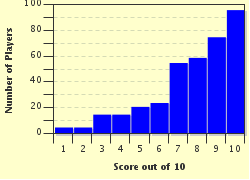Quiz Answer Key and Fun Facts
1. What was the name of the extremely talented cryptanalyst and computer scientist who, after being subjected to chemical castration, is believed to have taken his own life in 1954?
2. In 1957, the 'Report of the Departmental Committee on Homosexual Offences and Prostitution' was released for all to read. By what name was this report better known?
3. After Britain had had a decade to ponder the ideas set forth in the 'Report of the Departmental Committee on Homosexual Offences and Prostitution', many senior politicians thought it was the right time to decriminalise aspects of homosexuality. In 1967, the Sexual Offences Bill became the Sexual Offences Act and consequently some restrictions on homosexual activities were removed. Did the Sexual Offences Act 1967 decriminalise aspects of homosexual behaviour in all four nations of the United Kingdom of Great Britain and Northern Ireland?
4. There was a clash of cultures in 1971, when the Nationwide Festival of Light and the Gay Liberation Front went head-to-head. The Nationwide Festival of Light campaigned for a return to modest, traditional 'lifestyles' whilst the Gay Liberation Front wished for a modern, permissive society. What was the name of the social activist, known for the 'Clean Up TV Campaign', who was very active in the Nationwide Festival of Light?
5. In 1974, a writer and journalist for 'The Times' documented a personal transition from male to female in a publication called 'Conundrum'. What was the name of this writer who had previously reported on Edmund Hillary's ascent of Mount Everest?
6. In 1975, John Hurt put in an excellent performance as a camp, gay man who refused to hide his homosexuality in an era when homosexuals tried desperately to stay "in the closet". What was the name of this film starring John Hurt, that portrayed homosexuality in a positive manner to the mainstream British television audience of the 1970s?
7. The year 1982 saw the establishment of the Terry Higgins Trust, an organisation that would later become known as the Terrence Higgins Trust. This group, well-known in gay communities across the UK, campaigned on issues related to what?
8. In the context of LGBT (Lesbian, Gay, Bisexual, Transgender) history of the 1980s, what was significant about the Member of Parliament for Islington South and Finsbury, Chris Smith?
9. A local authority (such as borough or county councils) "shall not intentionally promote homosexuality". This is an excerpt from the infamous Section 28 of the Local Government Act 1988, a piece of legislation that passed through parliament under the Premiership of which of the following people?
10. In 1989, an organisation was established with the aim of campaigning for the rights of LGBT people. What was the name of this group that took inspiration from the famous rebellion that took place in the USA in 1969?
Source: Author
jonnowales
This quiz was reviewed by FunTrivia editor
bloomsby before going online.
Any errors found in FunTrivia content are routinely corrected through our feedback system.

